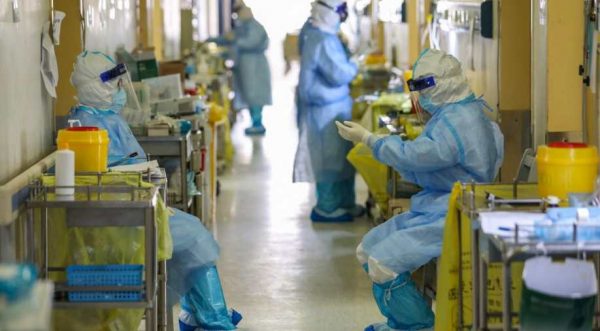LONDON: A British government virus-tracing app launched as part of measures to combat COVID-19 is facing criticism over data privacy and concerns over London’s broader pandemic strategy.

Scientists advising the government believe that the app, which would alert users when someone who has the virus is near them, could allow the government to ease lockdown restrictions while reducing the disease’s spread.
The app, which will run on an opt-in basis, is expected to be released around the time the lockdown is lifted.
But experts fear that the government has failed to issue clear direction on its strategy around the lockdown and the proposed technology.
Britain entered a nationwide lockdown on March 23, which Prime Minister Boris Johnson said would last three weeks.
However, Cabinet Minister Michael Gove has suggested that the lockdown could be extended as the country reckons with the COVID-19 pandemic.
National Health Service (NHS) directors hope that the app will be downloaded by at least 50 percent of the population to allow for effective mass tracking.
It will use a mixture of close-range Bluetooth signals and COVID-19 infection data to alert people if they have recently been near someone who has tested positive for the disease.
The chief of the NHS tech division, Matthew Gould, said it was “looking at whether app-based solutions might be helpful in tracking and managing coronavirus, and we have assembled expertise from inside and outside the organization to do this as rapidly as possible.”
Andrew Lilico, executive director of business management consultancy Europe Economics, told Arab News that the proposed app would be “an invasion of privacy,” but that strategies used to counter this issue through artificial intelligence management could mean “that privacy may not much matter.”
FASTFACT
Privacy versus health
PROS • Reduces virus spread • Expands data on pandemic • Reassures population CONS • Data privacy concerns • Bluetooth connectivity not guaranteed • How does it fit into wider strategy?
He said: “What we don’t know is what the gain is. How many lives does the government believe it is saving? How long would it anticipate us using the app? We need to understand the gains more than the losses.”
But “the government’s communication recently has been very poor,” he added. “I no longer understand how it anticipates exiting this crisis. Is it an existing therapy with up to six months of lockdown, or waiting for a vaccine with over 18 months of lockdown? It looks like it now believes in case management and containment, even though it said that was impossible.
“How many lives does it believe its strategy might save? The government hasn’t said. It shouldn’t be acceptable to overturn our whole society, with huge implications for human freedom, without spelling out what’s at stake and why the strategy might work.”
In recent weeks, development of the app has been headed by American company Pivotal — a subsidiary of software giant VMware — adding to concerns about how British data will be used.
Caroline Das-Monfrais, chief strategy officer at FTI Consulting, said transparency regarding privacy is critical.
“In times of emergency, we give more power to the state than we do in normal times. With privacy rights, we may need to make serious concessions if we’re to win the fight against COVID-19,” she told Arab News.
“However, it’s important that we’re able to get back to normal after the emergency. We need a health app that can save lives using data while also protecting privacy. If we make concessions now on how our data is being used, what will happen after the pandemic? The government will need to answer those questions,” she added.
“Concerns around privacy need to be managed properly and clarified to avoid unintended consequences. Right now everyone’s trying to do the right thing, but once you’ve given up your data you can never get it back. Transparency is key.”
Das-Monfrais said tech companies had been instrumental in the fight against the COVID-19 pandemic, citing 3D printed ventilators for hospitals, Amazon’s supply chains and price-gouging limitations, and Facebook’s pledges to remove fake news.
“Businesses have stepped up across the board, and it’s especially true of tech. For a long time, tech firms have been perceived as the younger sibling of the business world. Those companies have now stepped in and showed that they’re very much part of the family and vital to all parts of our lives and the economy. But technology can only go so far. Tech is part of the solution, but it needs to be used as part of a broader strategy,” she added.
“Transparency and communications are key factors. Tech is agnostic — it allows you to capture data and aggregate it to look at virus strains, contagion and geographical spread among other issues. But if the app is to be used effectively, the government needs to develop a clearer strategy for many months down the line.”
Luckily for the UK, this is not the first time smartphones have been used for contact tracing around the world.
Since the pandemic flared in London, the government secretly requested that mobile network O2 hand over anonymized smartphone location data.
This was reportedly done to check if the government’s announcements had led to people staying at home.
International examples that could form inspiration to the British government’s approach include TraceTogether, a similar Bluetooth technology app in Singapore that has been used to counter COVID-19 in the city state.
The app, which has been downloaded more than 800,000 times, has reportedly been instrumental in helping flatten the curve of new cases, saving lives and reducing the infection rate.
Ireland, which reacted faster than the UK by shutting down schools and universities in mid-March, is also expected to reveal similar plans on contact-tracing technology.
The private and confidential approach of Singapore’s successful model has not been replicated in South Korea, where the government has texted its citizens the age, gender and location of infected persons within 100 meters of them.
South Korea has been praised for its stringent and effective strategy, which quickly flattened the curve of cases ahead of other regional powers, but fears of a second spike have resurfaced.
Prof. Chris Whitty, chief medical officer for England, has dismissed South Korea’s approach. Speaking to the British Parliament’s Health and Social Care Committee, he said the identity-sharing approach could lead to vitriol and abuse on social media.
“As a doctor, I’m very against giving any patient-identifiable information, and for that reason we should also be careful,” he added.
“I’m not in favor of going down to street level or ‘you are within 100 meters of coronavirus.’ That’s the wrong approach for this country.”




